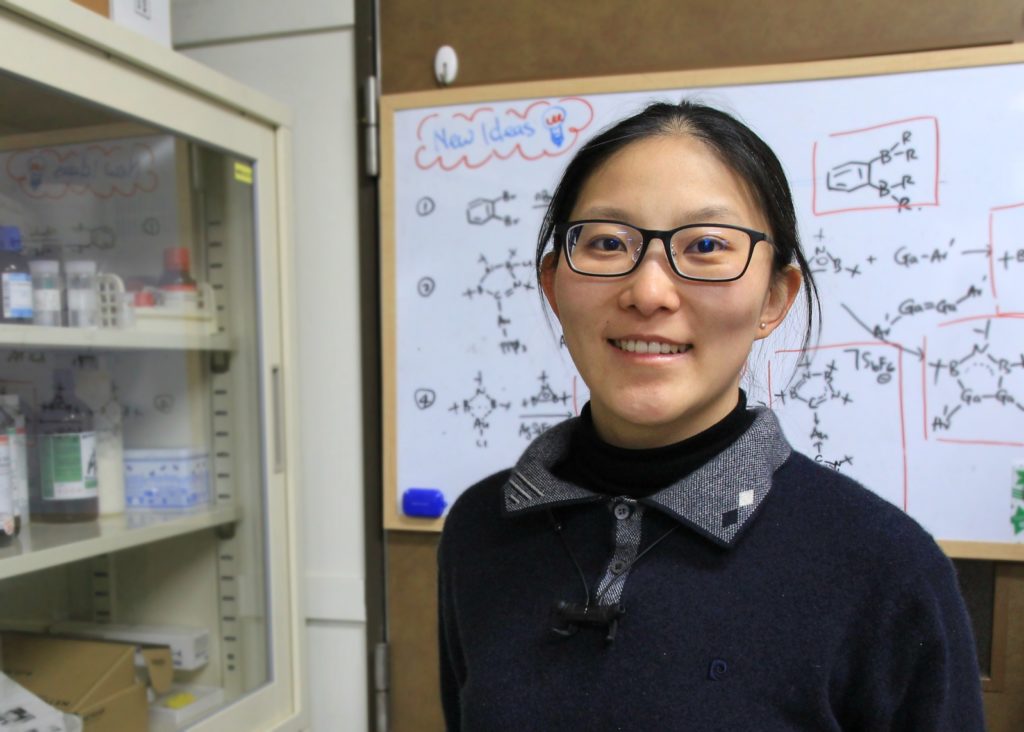
Dr. Rong Shang, in her lab at the Graduate School of Science. (Photo: Margaux Phares)
Dr. Rong Shang is a chemist. In her words, ‘We are always making new stuff.’ She and her colleagues build molecules combining organic atoms, like carbon and hydrogen, with metals, like gold and platinum. Originally from China, Dr. Shang studied and worked in three different countries before coming to Japan. Now she is Assistant Professor at Hiroshima University. She previously talked with us about her work in the lab. Here, she tells us about her path to becoming a scientist, how research is like a soccer game, and the importance of thinking beyond oneself.
What got you interested in science in the first place?
Growing up in China, I was encouraged to study science. Even still, I was divided between studying science and arts.
My family also believed that learning English abroad was important. International students have a disadvantage with language, though. Compared to fields in the arts and humanities, like geography or history, science was seen as an easier way to overcome the language barrier.
So, I chose to study science! I moved to Tauranga, New Zealand, and lived there throughout high school and college.
How did your attitude toward studying science change over time?
I admire people who know exactly what they what to pursue. I am the opposite – I like many things! I liked animals, but zoology was too specialized to be an undergraduate course of study. I was also considering philosophy, physics, and psychology. It was quite stressful deciding what I wanted to study. I remembered calling my dad and asking him, ‘What I should do?’
Then suddenly this offer came to me: The head of the Department of Chemistry at the University of Canterbury told me that my university entrance exam was high enough that I could receive a scholarship for and skip my first year of studies. Eventually my dad said, ‘You should just choose yourself.’ So, I accepted the offer and chose chemistry.
I had the opportunity to take a biology course, but I realized that I am better at chemistry. I came to appreciate the precision and logic of it. I’m happy I chose to study what I'm good at.
Anyone can come to this path. I was not very clear I was going to be a scientist in the beginning! Whether or not you know right away that science is what you want to do, I think the most important thing is to have a strong work ethic.
What do you enjoy most about being a scientist?
I like making stuff. What I enjoy most about chemistry, though, is designing an experiment and seeing if it works. If I have an idea for one, sometimes I get so excited that I can’t sleep!
We can use techniques like X-ray crystallography to investigate a molecule we build. If my molecule is quite interesting, sometimes I get impatient waiting for analysis to finish. I think to myself, ‘Tomorrow I will get up and run to the lab and solve the structure!’
Have any of those times looking at your molecule caught you by complete surprise?
That is usually the case! Science is like watching a soccer game. It can be a very exciting game, even with just one goal scored. Soccer players spend most of the game running around the whole field and trying to get a ball in the net. Most of the time in science, you don’t score, and you have to keep running. But when you do score, it is such a euphoric feeling!
What is one misconception about being a scientist you wish you could address?
In my culture, being a scientist is considered too highly educated for women – especially one with a Ph.D. Yet regardless of where I am, sometimes I feel like outsiders remember scientists as scientists and not as individuals. Not all scientists have the same personality, and yet we are all categorized in the same box. Whether one is male or female, it would be nice to have more individuality as a scientist.
If you had one piece of advice for a new scientist, what would it be?
Anyone can come to this path. I was not very clear I was going to be a scientist in the beginning! Whether or not you know right away that science is what you want to do, I think the most important thing is to have a strong work ethic.
My job is supposed to educate people and make progress for research. I think these things are very noble things to do, so I want to do well in them. It is not because I want to be the best, but it is because I want to fulfill my purpose to the best of my ability.
If you have the heart to think beyond yourself – whether it is teaching students or cleaning out the lab microwave for others to use – you can succeed in anything you set out to do.
Originally written by Margaux Phares (Hiroshima University Science Communication Fellow)
Originally published on March 8, 2018

 Home
Home